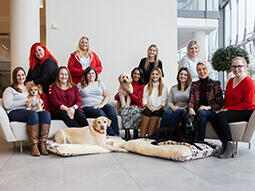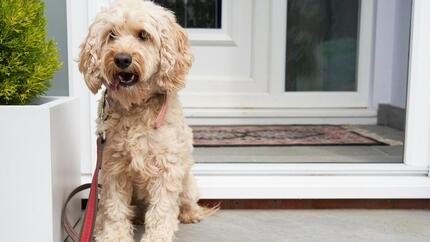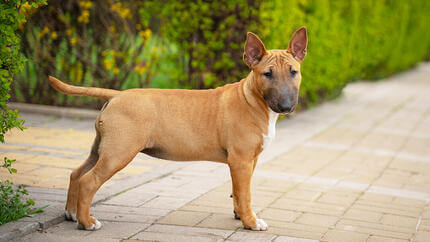

French Bulldogs have become an incredibly popular breed in recent years, which is due to their adorable bat-like ears paired with their wrinkly face, alongside their quirky and playful personalities. Sadly, this popularity has also had a downside and there’s now a long list of French Bulldog health problems that have arisen due to irresponsible breeding practices.
French Bulldog health problems
French Bulldogs are currently classed as a category 2 by the UK Kennel Club which means they have some particular points of concern. The most common health issues to affect the breed are listed below.
French Bulldog respiratory system disorders
The most notable French Bulldog health issue is brachycephalic obstructive airway syndrome (BOAS), which they’re more prone to as they’re a flat-faced breed. BOAS is caused by a shortened facial structure which causes compression of the tissues at the back of the nose and throat, leading to respiratory issues.
On top of this, their flat faces make it difficult for them to pant and cool themselves down in hot weather, so they’re also more likely to experience heat stroke and overheating. For this reason, it’s imperative to keep them out of extreme temperatures and to avoid over-exercising.
To reduce the chances of purchasing a French Bulldog with this health condition, ensure that both parents have had the necessary screening and look for puppies with longer noses and wider nostrils because these features will allow these animals to breathe better.
French bulldog eye problems
Their flattened faces don’t just cause them to experience respiratory issues, this shape also causes their eyes to protrude, making them more exposed and prone to infections and injuries. Here are some of the French Bulldog eye problems you should keep watch for:
Corneal ulcers
As a French Bulldog’s eyes tend to protrude from their face more than other breeds, they’re more prone to corneal ulcers which are a serious and painful condition. These are typically caused by trauma, dry eye, or chemical burns and if your dog has this issue, you may spot them rubbing their eyes to try and relieve the pain. Take them to the vet as soon as possible if you suspect a corneal ulcer, because urgent veterinary care is key to treating this condition.
Dry eye
Dry eye occurs when insufficient tears are produced and maybe because of a congenital defect—which is usually the case in Frenchies—or a disease or medication. This dryness can cause the surrounding eye tissue to become inflamed and painful or you may see your dog blinking or squinting a lot or note the presence of yellow or green discharge.
Cherry eye
Cherry eye is a common French Bulldog eye problem. This issue is the result of the gland inside the third eyelid protruding from the eye socket, which looks like a large, red, almost cherry-like lump. If you suspect your dog has cherry eye, seek veterinary treatment as soon as possible because it’s likely that the gland will have to be sewn back into a pocket inside the third eyelid.
Conjunctivitis
As French Bulldogs are more prone to eye infections, conjunctivitis is also more common in this breed. These are usually caused by bacterial or viral infections or allergic reactions and you’ll need to be on the lookout for pink or red eyes, blinking more than usual and mucus, pus, or discharge.
French Bulldog skin problems
There are a number of French Bulldog health issues that can affect their skin. These are often due to their environment and/or their wrinkly skin. Here we list the most common ones:
Skin allergies
Skin allergies are more likely in French Bulldogs and are usually caused by environmental factors such as pollen and dust mites and food intolerances from things like wheat or substances their skin comes into contact with such as washing liquids. These allergies can also be caused by parasites and fleas, so it’s especially important that you keep on top of your flea and worming treatments.
Skin fold dermatitis
While their wrinkly skin may look cute, if it’s not properly cared for and cleaned regularly, it can result in skin fold dermatitis. This is where the wrinkles become inflamed and sore and without treatment, can also become infected.
French Bulldog ear problems
The big bat-like ears of French Bulldogs are a selling point for many, but unfortunately, these can also be a cause for concern. This is because these dogs have narrow ear canals coupled with wide openings, making it extremely easy for germs and debris to get in and cause infections.
It’s important to keep a close eye on your Frenchie’s ears, maintain a regular cleaning schedule and keep a lookout for redness, discharge or repetitive scratching of their ears. If you suspect an ear infection, take your dog to the vet because they may require antibiotics.
French Bulldog skeletal problems
Some of the most common French Bulldog health problems are related to their skeletal systems because they were bred to have short back legs and a curly tail.
Patella luxation
Patella luxation is where the kneecap slips temporarily out of place and is a fairly common condition in smaller breeds and one which French Bulldogs are particularly prone to because of their build. You may spot your dog hopping as its kneecap slips out and then returning to normal movement when it pops back in. The condition is graded from 1 to 4, from least to most serious, with the latter perhaps requiring surgery.
Intervertebral disc disease
With intervertebral disc disease, the discs that provide cushioning between the back bones become damaged or brittle, making them more likely to bulge, burst or slip, resulting in pressure on the spinal cord. Treatment for this condition depends on the severity, location and cause and may involve anything from medication to surgery, or a combination of the two.
French Bulldog dental problems
Because they have a very shortened jaw but a standard size and number of teeth, a French Bulldog’s health issues can also extend to their gums and teeth. One of the biggest causes of concern is tooth overcrowding.
Preventing French Bulldog health issues
The French Bulldog health problems listed above are just conditions that this breed are predisposed to. There’s no guarantee they’ll get them, but they are at a higher risk of them. To reduce the risk of your dog developing these issues, it’s important that you only buy from a reputable breeder that’s knowledgeable and cares about the welfare and future of the breed. Responsible breeders will also ensure that all the necessary screenings and tests are done on breeding bitches and dogs to make sure they don’t carry poor genes.
If you want to find out more about breed-specific health, read our guide on common health problems in Pugs next.
Discover our dog food:
Related articles











